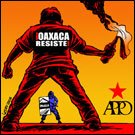
Dear friends,
The police intelligence agent was aiming through the gun slot of the guard post at the people who were marching through Saravena on August 5. He was crouched down below the bullet-proof glass window and was photographing the people that were commemorating the fourth anniversary of the killing of three beloved community leaders.
An army truck then rushed to the front of the march and several soldiers jumped out with automatic rifles. One of the soldiers was also armed with a camera and he started taking photos, as well. Two soldiers on motorcycles rode through the people at the front of the march and then roared away.
More than a thousand people marched along the main streets of Saravena that day in the subversive act of honoring the memory of Alirio Martinez, Leonel Goyeneche and Jorge Prieto. During the early morning of August 5, 2004, soldiers took the three men out of Jorge’s home in Caño Seco and executed them. Vice President Santos and Defense Minister Uribe said that the men were guerrillas who had shot at the soldiers, and the soldiers then shot back in self-defense.
Alirio was the president of the state Peasant Association, Leonel was the director of an alternative adult high school in Saravena, and Jorge was the president of the Saravena health workers union.
A “memory gallery” was created in front of the social organizations’ building in Saravena on August 4 (see attached photo). Three banners were hung from the second floor with the names of Alirio, Leonel and Jorge. Photos of people who had been killed by the government security forces and the right-wing paramilitaries were then placed in front of the building.
Hundreds of people gathered together that evening to honor the victims of government violence in the state of
The march the following day ended at a sports arena. Father Teodoro and other priests from the churches of Saravena held a mass there for Alirio, Leonel and Jorge. During the homily, Fr. Teodoro called for “an end to the killings, mass arrests, hunger and poverty.”
Three of the family members then spoke in honor of their loved ones. Aide was 21-years-old when her father, Alirio, was killed. The last time she saw him alive was in January 2003 when she left
“Papa, your light shines in us, in each of our hearts, and we will uphold your example,” said Aide. “Today your life nourishes the ground on which the new
Abdon Goyeneche is a teacher, like his brother Leonel. He talked about his brother and he also described being arrested shortly after the second anniversary of the killing in 2006. Abdon was charged with “rebellion” and spent ten months in prison. Luis Ernesto Goyeneche, another brother, was arrested for “rebellion” in December 2006 and is still in prison in
Cesar Prieto came up to the stage with his niece, one of Jorge’s daughters. Jorge’s son, Nelson, spoke during the first anniversary of the killing but was unable to attend this year. Nelson was a leader of the Saravena health workers union, and he was arrested for “rebellion” in February 2007 and is still in prison in
One of the slogans of the social movement here is “
In love and solidarity,
Scott











